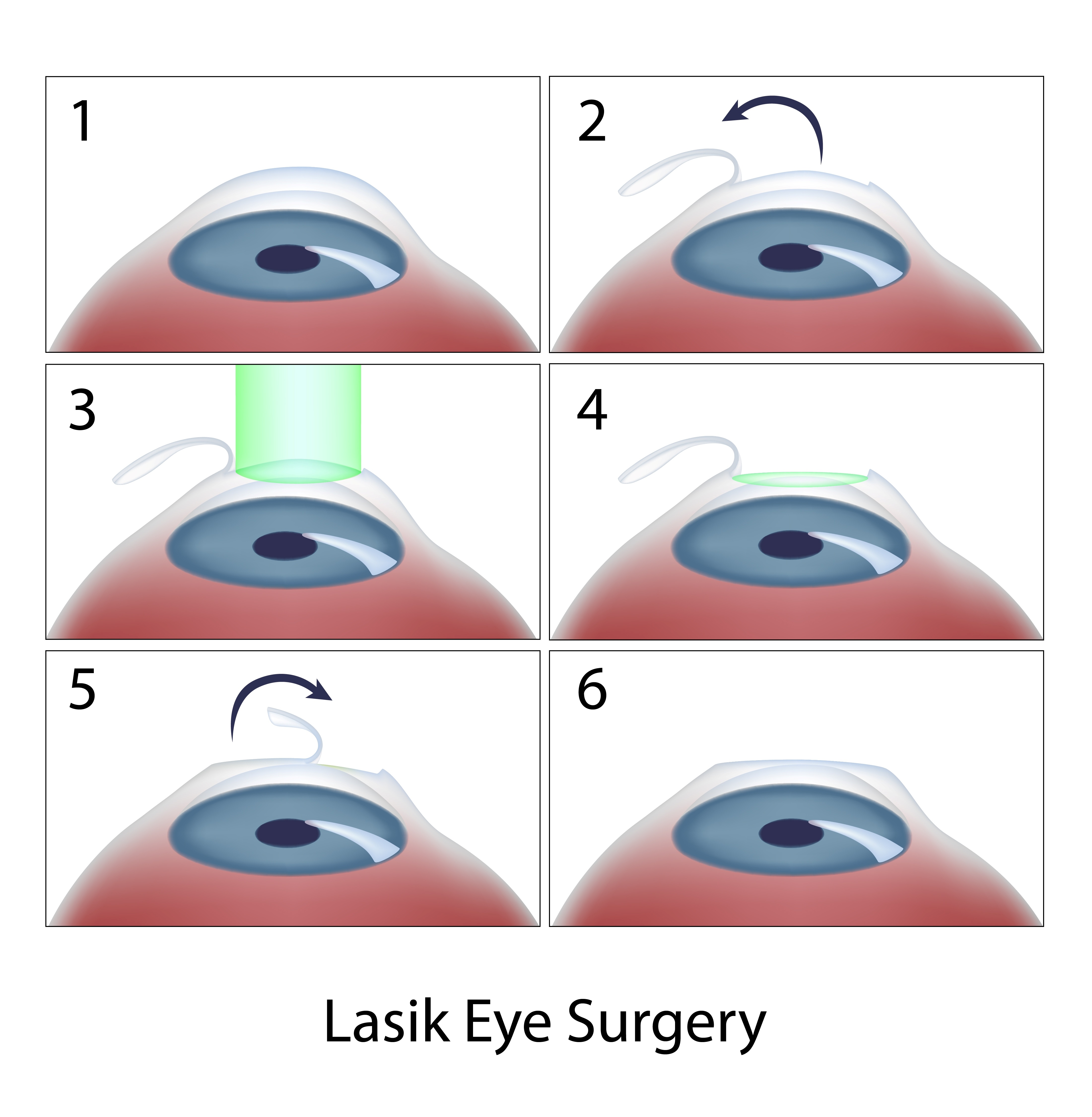Updated on February 20, 2024
Is LASIK Safe?


Vision Center is funded by our readers. We may earn commissions if you purchase something via one of our links.
Is Lasik Safe Long-Term?
The American Refractive Surgery Council (ARSC) states that the LASIK procedure is safe. A "huge amount of clinical research supporting its impressive record for safety and effectiveness" proves this.1
According to the U.S. Food and Drug Administration, 95 percent of LASIK participants were satisfied with their results.
— U.S. Food and Drug Administration, 2021
LASIK eye surgery is a procedure that changes the cornea using an excimer laser. It can permanently correct vision problems, including:

This laser vision correction is generally safe long-term. However, like with any refractive surgery, there are some potential risks.
A small percentage of LASIK patients may experience side effects. But most side effects clear up within a few days to weeks.2
LASIK Eye Surgery Success Rate
Patient satisfaction with LASIK laser eye surgery is very high. In 2016, the ARSC published the results of the annual American Society for Cataract and Refractive Surgery (ASCRS) meeting showing:3
- LASIK achieves a satisfaction rate of up to 98 percent among people
- Nearly 100 percent achieved at least 20/40 vision
- More than 90 percent attained 20/20 vision
- Less than 1 percent lost two or more lines (on the eye chart) of best corrected visual acuity (BCVA)
Generally, you'll receive excellent results if you have reasonably good vision with only mild refractive errors before surgery. Before LASIK surgery, consider what you hope to achieve with the procedure to help define and meet your expectations.
Common Side Effects of LASIK
The common side effects of LASIK eye surgery include:
- Temporary discomfort
- Vision disturbances
- Light sensitivity
- Itchy or scratchy eyes
- Dry eyes
- Halos and vision fluctuations
Most side effects are often mild. During the first year after surgery, only one percent of people report side effects that interfere with their daily lives.4
LASIK Risks & Potential Complications
The following are severe but rare risks of LASIK vision correction surgery:
- Decreased ability to see
- Corneal infection
- Scarring in the cornea
- Reduced or complete vision loss
- Under corrections
- Overcorrections
- Glare, halos, and double vision
- Astigmatism
- Flap problems
- Regression
- Night vision problems
- Severe dry eye syndrome
- Diffuse lamellar keratitis
Diffuse Lamellar Keratitis
Diffuse lamellar keratitis (DLK) is a type of inflammation that leads to significant itching and discomfort. It occurs underneath the corneal flap created during LASIK and arises within 24 hours after the surgical procedure.
People with DLK experience:
- Itchy eyes
- Unusual eye exam results
- Hazy and cloudy eyes
- Severe eye damage in cases of no medical treatment
- Swelling of eye cells
- Scarring of cornea
To treat DLK, eye doctors or ophthalmologists use eye drops to reduce swelling, clear haze, and alleviate discomfort. After treatment, the condition resolves within 5 to 8 days.
Factors That Lead to Vision Reverting Back After LASIK
In rare cases, vision may eventually return to previous levels. This is often due to difficulties and issues with the healing process, pregnancy, hormone imbalances, or other vision problems.
Vision loss is another infrequent complication of LASIK. This complication occurs in one percent of people undergoing the procedure.
Is LASIK Better Than Glasses and Contacts?
Depending on the circumstance, LASIK vision correction surgery can be an excellent alternative to glasses and contact lenses. In 2014, an American Academy of Opthalmology (AAO) meeting said LASIK:5
- Improves your night vision, especially while driving, compared to glasses and contact lenses
- Reduces the rates of eye infections, ulcers, and eye abrasions
- Resulted in higher levels of satisfaction at 1, 2, and 3 years at follow-up appointments compared to contacts
- Allows you to spend less on glasses, contacts, and maintenance supplies
- Laser vision correction procedures and contacts present similar risks of dry eye, while glasses typically cause less dry eye symptoms
While LASIK may not eliminate the need for glasses or contacts fully, it does make people rely less on them after the surgery.
Summary
LASIK vision correction surgery can be an effective alternative to glasses and contact lenses. While the procedure has minimal risks, they’re manageable with proper care.
If you opt for surgery, follow up with your refractive eye surgery doctor or LASIK surgeon to treat potential complications quickly and effectively.
In this article
13 sources cited
Updated on February 20, 2024
Updated on February 20, 2024
About Our Contributors
Ellie is a full-time freelance writer with a diverse portfolio in the medical field, including a focus on optometry. She crafts content in areas such as dentistry, addiction, mental health, and eye care. Her mission is to produce authoritative and research-backed optometry content, guiding readers to take care of their eyesight and seek necessary treatments.
Dr. Melody Huang is an optometrist and freelance health writer with a passion for educating people about eye health. With her unique blend of clinical expertise and writing skills, Dr. Huang seeks to guide individuals towards healthier and happier lives. Her interests extend to Eastern medicine and integrative healthcare approaches. Outside of work, she enjoys exploring new skincare products, experimenting with food recipes, and spending time with her adopted cats.

